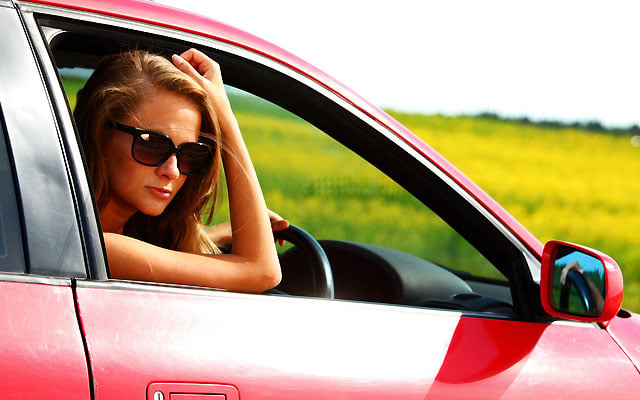10 August 2023
Drivers have dished the dirt on the worst habits they witness on the road in the heat, following reports warmer weather is on the way to rescue the British summer.
An AA Driving School survey* has discovered etiquette goes away on holiday over summer as one third have seen others trying to eat an ice cream (32%). Nearly two-fifths have also seen drivers wearing sunglasses that looked too dark (39%) and others have opted to keep large sunhats on in their vehicle, blocking their vision behind the wheel (9%).
The most common poor summer driving behaviour is littering from a vehicle, which was seen by 73% of drivers. Local councils have had the power to issue fines to drivers for littering since April 2018, but AA research suggests few councils have used these powers, let alone adopted the policy.

More than half have witnessed other vehicles with front passengers putting their feet on the dashboard (57%) and one in ten have seen people dangling their legs out of the window in a moving vehicle (16%). In a crash this behaviour could reduce the effectiveness of the air bags and cause more harm to the vehicle occupants.
Shockingly 8% have seen someone picnicking on the hard shoulder and 4% have also seen others applying suncream while driving. Although suncream is a packing essential for summer trips, it is much safer to apply before you set off than risk trying while in control of a vehicle.
Drivers are advised to check their tyres before setting off on journeys during hot weather. High road surface temperatures will increase the risk of a blowout; especially if a vehicle’s tyres are already damaged or at the wrong pressure. Many UK towns and cities have mobile tyre fitters who can come to your home or workplace to replace them.
Camilla Benitz, Managing Director at the AA Driving School said: “Many drivers may be heading for the country and coast to make the most of the warmer temperatures, so setting off in the coolest part of the day could avoid traffic and reduce the risk of your engine overheating.
“Summer should be the perfect time to enjoy exploring the UK and beyond by car, but there’s no excuse for vehicle occupants dropping litter – it’s illegal, damages the environment, and puts road workers at risk when they have to clear up the mess.
“Allowing extra time for your journey, including breaks to cool off and enjoy an ice lolly and apply suncream, will help to reduce distractions. You could get burnt with more than a fine if your melting 99 leads to an accident.
“Even if the summer is a washout always pack the essentials including plenty of water, snacks, a fully-charged mobile phone and sun protection, and allow extra breaks in the journey to rest and cool off. It pays off to carry out some basic maintenance checks too - make sure you have enough fuel and check the condition of your tyres, as hotter temperatures can lead to a blowout.”
Top five most common summer driving woes- Littering from a vehicle (73%)
- Front passengers putting their feet on the dashboard (57%)
- Drivers wearing sunglasses that are too dark (39%)
- Eating an ice cream while driving (32%)
- People dangling their legs out of a moving vehicle (16%)
“You could get burnt with more than a fine if your melting 99 leads to an accident.”Summer driving laws
Dark sunglasses and wide-brimmed hats can restrict your ability to see the road and reduce reaction times. Rule 94 of the Highway Code states that drivers should not use tinted glasses, lenses or visors if they restrict their vision at night or in poor visibility.
The AA advises drivers choose sunglasses below a category 3 rating for day driving. Category 4 sunglasses, with the darkest tint for bright sunlight, are not suitable for day or night driving.
The Highway Code also states drivers should avoid distractions including eating and drinking (Rule 148), as safe driving requires full concentration.
Find more summer driving tips at: theaa.com/driving-advice/seasonal/summer
*Yonder conducted an online sample of 11,565 UK adults aged 18-65+ between 12th and 20th June 2023. Data is weighted to be representative of the population of the UK. Targets for quotas and weights are taken from the PAMCO survey, a random probability survey conducted annually with 35,000 adults. Yonder is a founding member of the British Polling Council and abides by its rules.
